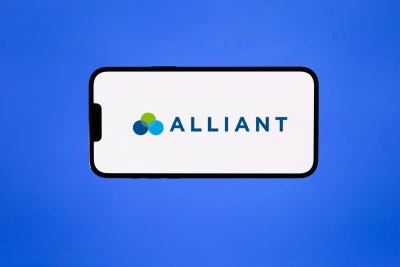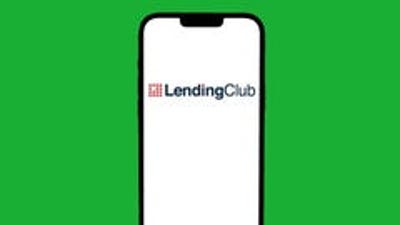There are two big benefits to opening an account with an online bank versus a brick-and-mortar bank: lower fees and higher interest rates on your savings. However, if you regularly deal with physical dollars, an online bank may not seem like the best fit to manage your money. Some of the most well-known online banks, such as Ally and Marcus by Goldman Sachs, do not accept cash deposits. If you are looking to earn a higher return on your money through an online bank, here are some of the best that accept cash deposits.
Compare the best online banks for cash deposits

Alliant Credit Union
Read Alliant Credit Union Review- No monthly fees or minimum balance requirements
- Pays 0.25% APY for checking accounts
- Reimburses up to $20 of ATM fees per month
- Cash deposit limit: Not disclosed
Alliant Credit Union’s High-Rate Checking account pays 0.25% annual percentage yield and doesn’t charge any monthly maintenance fees. The digital credit union also makes dealing with cash fairly easy -- you can deposit cash at a wide range of partner ATMs. Withdrawing cash is even easier, thanks to a network of more than 80,000 fee-free machines for withdrawals (cash deposit locations are more limited). And if you somehow struggle to find a free spot among all those machines, Alliant reimburses up to $20 of ATM fees per month.

Capital One Bank
Read Capital One Bank Review- No monthly fees or minimum balance requirements
- Pays 0.10% APY for checking accounts
- Sophisticated mobile app
- Offers limited in-person services at branch and cafe locations
- No daily cash deposit limit, but one-time ATM deposits are limited to $5,000
While not exclusively an online bank, Capital One’s 360 Checking account already checks all the boxes of a great online checking account: no fees, competitive APYs and access to a big network of fee-free ATMs to withdraw or deposit your money. The bank’s Cash In Store feature lets you deposit cash at a participating Walgreens, CVS or Duane Reade location. You’ll simply open Capital One’s mobile app, choose the account and amount of cash you want to deposit, and the app will present you with a barcode. Hand this to the cashier along with your cash (there’s a 30-minute limit once you get the code), and your money will be available almost instantly.

Chime
- No monthly fees or minimum balance requirements
- Chime Checking (which allows cash deposits) doesn’t earn interest, but you can link to a Chime Savings account and earn 2% APY
- Additional tools such as a credit-building secured credit card
- Cash deposit limit: $1,000 every 24 hours or $10,000 per month
Chime has captured plenty of attention from consumers, especially millennials, looking for a banking alternative. Like Capital One, you can deposit cash in store, but Chime partners with fewer stores than Capital One for fee-free deposits – only Walgreens and Duane Reade. There are plenty of other additional places to make cash deposits such as CVS, Speedway and Kwik Trip, too, but you’ll pay a fee for the service.

NBKC Bank
- No monthly fees or minimum balance requirements
- Pays 1.50% APY for “Everything” accounts
- Reimburses up to $12 per month in out-of-network ATM fees
If you live in the greater Kansas City area, NBKC won’t feel like an online bank since there are a few branch locations throughout the region. However, the bank’s Everything account is open to everyone – even if you don’t root for the Chiefs and Royals. NBKC lets you make cash deposits at select MoneyPass ATM locations, which you can find by filtering to solely include “deposit-taking ATMs” here. The one downside to consider is that deposits at MoneyPass ATMs can take a long time to show up in your account – up to 5 business days.

LendingClub
Read LendingClub Review- No monthly fees
- Minimum opening deposit of just $25 and no ongoing balance requirement
- Offers a 1% cash back rewards for debit card purchases and 4.50% APY for high-yield savings accounts
- Unlimited ATM fee rebates
LendingClub is part of the MoneyPass ATM network, and the company allows both rewards checking and high-yield savings account holders to make cash deposits at the network’s select deposit-taking ATM locations. Plus, taking that cash out is a completely worry-free experience, thanks to unlimited ATM fee rebates.
How to deposit cash with an online bank
While some online banks and credit unions accept cash deposits at select ATM locations, your options may be limited to a small number of machines. For example, the Allpoint Network is one of the most common networks that give credit union members and online banking customers access for withdrawals. However, the network’s locations for cash deposits include just over 1,500 machines that accept money – significantly fewer than the 55,000-plus machines that offer free withdrawals.
ATMs aren’t the only option, though. Depositing cash with an online bank or credit union may involve visiting a partnering retailer and working with a cashier. Depending on how your bank works, you may be able to deposit the money with a debit card or by scanning a code in your mobile banking app.
Other ways to deposit money
If cash is still king in your day-to-day life, there are still plenty of other options for depositing money in an online bank.
- Set up an ACH transfer from another bank: Consider opening a free checking account at another bank with a convenient network of branches or ATMs. You can make your cash deposits at that institution and then set up an ACH transfer to your online bank account. You’ll need to enter the account number and routing number for each account and the details of the transfer. Additionally, keep in mind that these transfers may take a few days to process.
- Set up direct deposit: If your employer offers direct deposit, you can automatically direct a portion or all of your paycheck to your online bank. Again, you’ll need your account number and routing number, but this is one of the easiest ways to deposit your money.
- Get paid by check and use mobile deposit: If digital direct deposit isn’t an option, see about the option for an old-school paper check. Then, open your bank’s mobile banking app to make a mobile deposit. These simply involve a picture of the front and back of the check, and the deposit is typically processed in one business day. Some online banks may have a maximum check amount that you can deposit, says Rita Soledad Fernández Paulino, a CNET Money expert reviewer, personal finance coach and founder of Wealth Para Todos. Be aware of your bank’s limits before switching to a fully online account.
Online bank fees for cash deposits
When you’re depositing cash at an online bank, it might also cost you some cash, too. Review the bank’s fee schedule prior to opening a new account to find out whether you’ll have to pay when you make a cash deposit. And watch out for ATM or other cash deposit fees: Some partnering retailers may charge up to $4.95 for each deposit. These fees are often not reimbursed by your bank.
How to choose an online bank that lets you deposit cash
When you’re looking for a new bank, your cash deposit capabilities are only one piece of the puzzle. Here’s a rundown of the other key factors you should consider and what to look for before opening a new account:
- Are there extra features that can help you better manage all that cash? Banks and credit unions offer varying levels of technology, but some have tools that can help you save more. Banks can offer savings features that automatically round up purchases to the nearest dollar and transfer that small change to a linked savings account. Others might offer in-app budgeting tools to help you evaluate your spending patterns.
- What other products does the bank offer? If you don’t want to juggle one checking account at one bank, a savings account at another and an investing account somewhere else, you may want to choose a bank or credit union that has an extensive lineup of services – not just one type of account.
- What are the transaction limits? Banks and credit unions typically only let you deposit and withdraw a certain amount of money each day. If you regularly deal with a lot of cash, make sure you find a bank or credit union that will take all of it at once.
- Is it part of the FDIC or NCUA network? Verify that your money will fall under federal protection, which guarantees your money is safe up to $250,000 per account in case of bank failure. For banks, use the FDIC’s tool to look up any institution you’re considering, and for credit unions, use the NCUA’s database.
Methodology
To choose the best online banks for cash deposits, we compared terms and conditions from more than a dozen leading online banks and credit unions. To narrow our list, we chose institutions that checked the following boxes: widely available with limited or no membership/customer restrictions, no monthly service fees, low or no minimum opening deposit requirement, and the ability to make deposits for free or a low fee. Additionally, while we focused on the deposit functionality, we also evaluated the bank’s willingness to reimburse fees for cash withdrawals.

